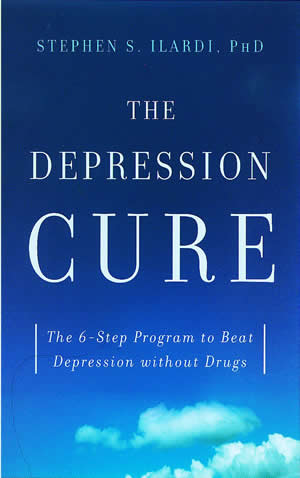
Book Reveiw: The Depression Cure
June 28, 2009 —
Never let them see you cry.
That used to be your motto – tears can be so inappropriate, right? – but these days, you can’t help crying and you don’t know why.
Maybe it’s the economy that’s got you down. Certainly, job and money stresses aren’t helping. Family obligations are overwhelming and your confidence level is kaput. Your spouse keeps wondering what’s wrong, and you wish you could say. Worse, everybody thinks you can just “snap out of it”.
When you’re experiencing depression, that’s just not possible, says Stephen S. Ilardi, PhD, and in his new book “The Depression Cure”( c.2009, DaCapo LifeLong – $25.00 / $31.50 Canada – 289 pages), he has hope for sufferers and their families.
In his research and his work with patients diagnosed with depression, Stephen Ilardi noticed something fascinating: modern-day hunter-gatherer bands have few, if any, incidences of depression. Conversely, the rate of depression in industrialized society has steadily risen to the point where fully 25% of us are at risk in our lifetimes.
Ilardi says he finally realized that our bodies and our minds weren’t created for the lifestyles that most of us have today. In addition to bad eating habits and lack of physical activity, we’ve become a society of stuck-indoors, sleep deprived loners. These things, says Ilardi, contribute to the crushing pain of depression.
But why do some people bounce back from adversity and others don’t? Their genes have something to do with it, Ilardi says. Child abuse and trauma certainly are factors, as is gender (women are twice as likely to be depressed) and lifestyle. Another major hallmark of depression is a mind consumed by ruminating, runaway thoughts.
So you think you might have the symptoms of depression. What can you do?
In this book, Ilardi outlines six steps you can take to overcome depression, whether you’ve tried drugs or not, whether they’ve worked for you or not, in a method he calls TLC (Therapeutic Lifestyle Change). The steps are simple to implement; you might even be doing some of them already. Even if you aren’t a depression sufferer, you can follow Ilardi’s TLC program, too.
And in case you missed it in the introduction, there – finally, on page 216 – is the disclaimer you need to read: see your doctor first. Tell your physician what you have in mind – particularly in regard to dietary supplements - and get clearance before you start any kind of program.
Lagging disclaimer and mega-dosing supplements aside, “The Depression Cure” is intriguing. Author Stephen S. Ilardi seems to be onto something when he points out that our ancestors didn’t sit at a desk all day and fight traffic to go home stressed-out. Other researchers have offered support for some of what Ilardi is claiming, albeit not together in a six-step method. I think, overall, this book worth checking out, but with caution. Even Ilardi says there is no one-size-fits-all fix for what ails ya.
Pick up a copy of “The Depression Cure”. With your doctor’s blessing, a fair amount of effort, and this book, “snapping out of it” might be a snap.
![]() Comment on "Book Reveiw: The Depression Cure" using the form below
Comment on "Book Reveiw: The Depression Cure" using the form below












